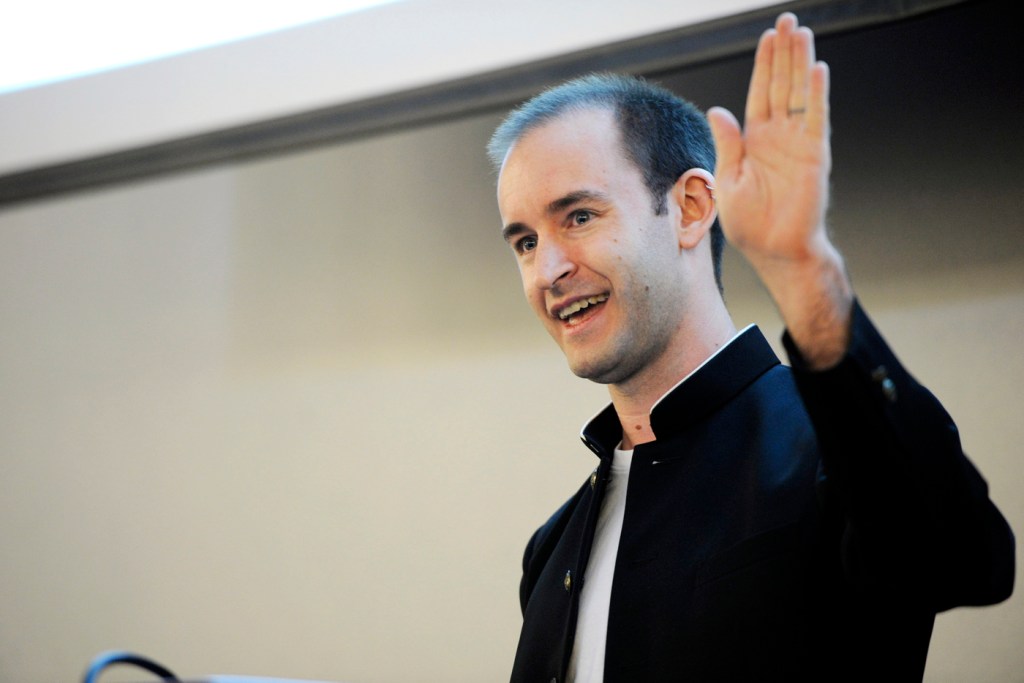Take 5: The impact of Web personalization

Christo Wilson, an assistant professor in the College of Computer and Information Science at Northeastern University, discussed the ins and outs of Web personalization on Monday afternoon in the Raytheon Amphitheater. His lecture marked the latest installment in the Minds over Matters: NUterm Faculty Speaker Series, which features weekly presentations from top faculty scholars who discuss their research and examine timely topics of global importance.
Here are five takeaways from his lecture:
Web personalization is ubiquitous
Do an innocuous Google search for “Old Navy” on your laptop in your residence hall and you’ll get a personalized set of results for the popular clothing retailer, including a list of the chain’s local stores. Or log in to your Netflix account and browse through row after row of movies and TV shows—films and programs that have been suggested to you based on the streaming service’s recommendation algorithms.
It’s no surprise anymore: Whether you’re killing time on social media platforms like Facebook, shopping for goods on e-commerce sites like Amazon, or downloading tunes from music services like Pandora, the content you see—and the products you purchase—have been tailored to match your preferences.
“We’ve all encountered personalization,” said Wilson, whose scholarship focuses on using measured data to analyze and understand the complex phenomenon of the Web. “By and large we love this stuff, and we’re delighted when Netflix knows we’re fans of House of Cards and tells us when the new season will be available.”
Price discrimination—and price steering—is a common practice
Wilson does not dispute the potential beauty of Web personalization, which oftentimes makes our lives better, simpler, and more convenient. But the practice, he said, is not infallible, and sometimes leads to cases of intentional manipulation and discrimination.
He and his research colleagues recently examined 16 popular e-commerce sites—10 general retailers and six hotel and car rental sites—to measure two specific forms of personalization: price discrimination, in which a product’s price is customized to the user; and price steering, in which the order of search results are customized to the user. They found evidence of personalization on four general retailers and five travel sites, including cases where sites altered prices by hundreds of dollars.
Among their findings: Cheaptickets and Orbitz implemented price discrimination by offering reduced prices on hotels to “members”; Expedia and Hotels.com steered a subset of users toward more expensive hotels; and Home Depot and Travelocity personalized search results for users on mobile devices.
“My goal is to increase transparency,” Wilson said. “Only when you understand a system and its data can you have an informed discussion on how it’s being used and whether we’re willing to accept that.”

Home Depot, Wilson found, personalized search results for users on mobile devices.
Google forgets after 10 minutes
Yes, Wilson said, it’s true: Google is intuitive and has the ability to shape the results of your next query based on your prior search history. This, he said, is called the carryover effect, wherein one past search can affect the results of the next search. But there is a caveat—and it’s a pretty big one. “Google only cares about prior search history for 10 minutes,” he said. “After 10 minutes they don’t care anymore. They forget.”
Mobile devices>laptops
In the Q&A following his lecture, one student asked Wilson to offer up some tips for getting the best price when shopping online. In response, he noted that “there is no simple answer since every site is doing something different,” and then reeled off a few must-do’s:
- Conduct your searches in a private browsing window, which will enable you to surf the Web without leaving a trail of cookies;
- Eschew your laptop for your smartphone or your tablet (Wilson and his research colleagues found that Travelocity offers discounts on hotels for users on mobile devices);
- And call up a friend to do a second search—his Internet cookies will be different—and then compare the results
Hacking is permitted
Wilson is one of five members of Northeastern’s personalization research group, which is housed within the College of Computer and Information Science. He and his colleagues post their open-source data and code from their research projects to their website, where you can find in-depth explanations of their work. “Everything we do is open source,” Wilson said. “If you’re technically-minded, go hack away.”





